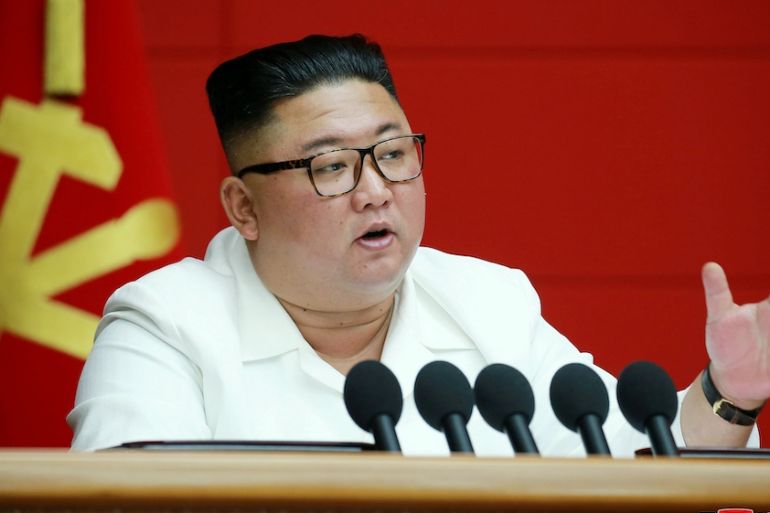Kim Jong Un gives unusually candid warning on North Korea economy
Hours after economic warning, South Korea officials said Kim had promoted his sister.

Kim Jong Un issued a dire warning for North Korea’s economy amid reports that he delegated some power to his sister, including responsibility for relations with the U.S.
Kim told a gathering a ruling party leaders that the country “faced unexpected and inevitable challenges in various aspects” and that his development goals had been “seriously delayed,” state media said Thursday. The unusually candid assessment came as sanctions, flooding and the coronavirus pandemic pushed the North Korean economy toward what was expected to be its worst contraction in more than two decades.
Keep reading
list of 4 itemsWill the US unemployment rate continue at historic lows?
Mexico’s teachers seek relief from pandemic-era spike in school robberies
‘A bad chapter’: Tracing the origins of Ecuador’s rise in gang violence
Hours later, South Korean lawmakers told reporters that the country’s spy agency determined that Kim had delegated responsibility for relations with Seoul and Washington to his younger sister, Kim Yo Jong. While she had taken an increasingly public role in diplomatic matters, such as responding to a letter from U.S. President Donald Trump earlier this year, the lawmakers described a more formal power-sharing arrangement.
Intelligence committee member Ha Tae-keung, who was among National Assembly lawmakers briefed by the spy agency Thursday, said the move didn’t indicate that Kim was adopting a “collective leadership” system similar to China’s Communist Party. “The absolute power of Kim Jong Un is being shared under the current leadership style of North Korea,” Ha said, adding that Kim still retained ultimate control.
North Korea also announced plans the first national congress of the ruling Workers’ Party of Korea since 2016 next year. The key party meeting in January would provide another platform to promote prominent officials such as his sister, and purge others. Last week, Kim replaced the premier he appointed a little more than a year ago, in another sign of political tension in Pyongyang.
Duyeon Kim, a senior adviser for Northeast Asia and Nuclear Policy at the International Crisis Group, expressed skepticism that Kim would relinquish any power in a state based on the supreme authority of the leader. “To say there is a partial transfer of power seems to be an exaggeration, given the system in North Korea,” she said.
The statement on the economy was the latest in a series of complaints by Kim Jong Un about the pace of key policy goals. In recent months, he has lashed out at cadres over what he saw as lax virus management and blasted the people responsible constructing his showcase Pyongyang General Hospital, saying they were flouting party policies and being “careless” with spending.
The North Korean leader also pledged to unveil a new five-year economic development plan at the upcoming party congress. The last meeting in 2016 of what is ostensibly North Korea’s highest-level decision-making assembly ended a 36-year lull when Kim’s father, Kim Jong Il, ignored party rules requiring such a gathering every five years.
“Planned attainment of the goals for improving the national economy have been seriously delayed and the people’s living standard has not been improved remarkably,” Kim told a gathering of the party’s Central Committee, according to the official Korean Central News Agency.
While state media made no mention of the U.S.-led sanctions regime on the country, Pyongyang has repeatedly lashed out at the campaign. In December, Kim similarly told the Central Committee that “the conditions of the national economy have not turned better,” adding “the role of the state as the organizer of the economic work has not been enhanced.”
Kim is facing difficulties on various fronts, and a reported health scare earlier this year raised questions about succession. His nuclear discussions with Trump have ground to a halt without him winning any sanctions relief, and the U.S. and South Korea this week kicked off joint military drills.
The economy was already under pressure from his decision to shut borders in January due to the coronavirus, which slammed the brakes on its minuscule legal trade. This year, the troubles could send the economy into its biggest contraction since 1997, according to Fitch Solutions.
Torrential rains that hit his state this summer have wiped out farmland, increasing food insecurity in the country where the United Nations World Food Program says about 40% of the population is undernourished. North Korea has boasted that it doesn’t have any confirmed cases of Covid-19, a claim doubted by U.S. and Japanese officials.
“Unless there is a major change – such as pushing for economic reform or improving relations with South Korea, China and/or Russia – it would be difficult for North Korea to deliver the economic prosperity it vowed,” said Yang Moo-jin, a professor at the University of North Korean Studies in Seoul who has advised the South Korean government over the years.
-With assistance from Shinhye Kang.